- Home
- Anthony Trollope
The Last Chronicle of Barset Page 4
The Last Chronicle of Barset Read online
Page 4
CHAPTER II.
BY HEAVENS HE HAD BETTER NOT!
I must ask the reader to make the acquaintance of Major Grantly ofCosby Lodge, before he is introduced to the family of Mr. Crawley, attheir parsonage in Hogglestock. It has been said that Major Grantlyhad thrown a favourable eye on Grace Crawley,--by which reportoccasion was given to all men and women in those parts to hint thatthe Crawleys, with all their piety and humility, were very cunning,and that one of the Grantlys was,--to say the least of it,--verysoft, admitted as it was throughout the county of Barsetshire,that there was no family therein more widely awake to the affairsgenerally of this world and the next combined, than the family ofwhich Archdeacon Grantly was the respected head and patriarch. Mrs.Walker, the most good-natured woman in Silverbridge, had acknowledgedto her daughter that she could not understand it,--that she could notsee anything at all in Grace Crawley. Mr. Walker had shrugged hisshoulders and expressed a confident belief that Major Grantly hadnot a shilling of his own beyond his half-pay and his late wife'sfortune, which was only six thousand pounds. Others, who wereill-natured, had declared that Grace Crawley was little better than abeggar, and that she could not possibly have acquired the manners ofa gentlewoman. Fletcher the butcher had wondered whether the majorwould pay his future father-in-law's debts; and Dr. Tempest, theold rector of Silverbridge, whose four daughters were all as yetunmarried, had turned up his old nose, and had hinted that half-paymajors did not get caught in marriage so easily as that.
Such and such like had been the expressions of the opinion ofmen and women in Silverbridge. But the matter had been discussedfurther afield than at Silverbridge, and had been allowed to intrudeitself as a most unwelcome subject into the family conclave of thearchdeacon's rectory. To those who have not as yet learned the factfrom the public character and well-appreciated reputation of theman, let it be known that Archdeacon Grantly was at this time, ashe had been for many years previously, Archdeacon of Barchester andRector of Plumstead Episcopi. A rich and prosperous man he had everbeen,--though he also had had his sore troubles, as we all have,--hishaving arisen chiefly from want of that higher ecclesiasticalpromotion which his soul had coveted, and for which the whole tenourof his life had especially fitted him. Now, in his green old age, hehad ceased to covet, but had not ceased to repine. He had ceased tocovet aught for himself, but still coveted much for his children; andfor him such a marriage as this which was now suggested for his sonwas encompassed almost with the bitterness of death. "I think itwould kill me," he had said to his wife; "by heavens, I think itwould be my death!"
A daughter of the archdeacon had made a splendid matrimonialalliance,--so splendid that its history was at the time known to allthe aristocracy of the county, and had not been altogether forgottenby any of those who keep themselves well instructed in the details ofthe peerage. Griselda Grantly had married Lord Dumbello, the eldestson of the Marquis of Hartletop,--than whom no English nobleman wasmore puissant, if broad acres, many castles, high title, and starsand ribbons are any signs of puissance,--and she was now, herself,Marchioness of Hartletop, with a little Lord Dumbello of her own. Thedaughter's visits to the parsonage of her father were of necessityrare, such necessity having come from her own altered sphere of life.A Marchioness of Hartletop has special duties which will hardlypermit her to devote herself frequently to the humdrum society of aclerical father and mother. That it would be so, father and motherhad understood when they sent the fortunate girl forth to a higherworld. But, now and again, since her August marriage, she had laidher coroneted head upon one of the old rectory pillows for a nightor so, and on such occasions all the Plumsteadians had been loud inpraise of her condescension. Now it happened that when this secondand more aggravated blast of the evil wind reached the rectory,--therenewed waft of the tidings as to Major Grantly's infatuationregarding Miss Grace Crawley, which, on its renewal, seemed to bringwith it something of confirmation,--it chanced, I say, that at thatmoment Griselda, Marchioness of Hartletop, was gracing the paternalmansion. It need hardly be said that the father was not slow toinvoke such a daughter's counsel, and such a sister's aid.
I am not quite sure that the mother would have been equally quick toask her daughter's advice, had she been left in the matter entirelyto her own propensities. Mrs. Grantly had ever loved her daughterdearly, and had been very proud of that great success in life whichGriselda had achieved; but in late years, the child had become,as a woman, separate from the mother, and there had arisen, notunnaturally, a break of that close confidence which in early yearshad existed between them. Griselda, Marchioness of Hartletop,was more than ever a daughter to the archdeacon, even though hemight never see her. Nothing could rob him of the honour of such aprogeny,--nothing, even though there had been actual estrangementbetween them. But it was not so with Mrs. Grantly. Griselda haddone very well, and Mrs. Grantly had rejoiced; but she had lost herchild. Now the major, who had done well also, though in a much lesserdegree, was still her child, moving in the same sphere of life withher, still dependent in a great degree upon his father's bounty, aneighbour in the county, a frequent visitor at the parsonage, anda visitor who could be received without any of that trouble whichattended the unfrequent comings of Griselda, the marchioness, to thehome of her youth. And for this reason Mrs. Grantly, terribly put outas she was at the idea of a marriage between her son and one standingso poorly in the world's esteem as Grace Crawley, would not havebrought forward the matter before her daughter, had she been leftto her own desires. A marchioness in one's family is a tower ofstrength, no doubt; but there are counsellors so strong that wedo not wish to trust them, lest in the trusting we ourselves beoverwhelmed by their strength. Now Mrs. Grantly was by no meanswilling to throw her influence into the hands of her titled daughter.
But the titled daughter was consulted and gave her advice. On theoccasion of the present visit to Plumstead she had consented to layher head for two nights on the parsonage pillows, and on the secondevening her brother the major was to come over from Cosby Lodgeto meet her. Before his coming the affair of Grace Crawley wasdiscussed.
"It would break my heart, Griselda," said the archdeacon,piteously--"and your mother's."
"There is nothing against the girl's character," said Mrs. Grantly,"and the father and mother are gentlefolks by birth; but such amarriage for Henry would be very unseemly."
"To make it worse, there is this terrible story about him," said thearchdeacon.
"I don't suppose there is much in that," said Mrs. Grantly.
"I can't say. There is no knowing. They told me to-day in Barchesterthat Soames is pressing the case against him."
"Who is Soames, papa?" asked the marchioness.
"He is Lord Lufton's man of business, my dear."
"Oh, Lord Lufton's man of business!" There was something of a sneerin the tone of the lady's voice as she mentioned Lord Lufton's name.
"I am told," continued the archdeacon, "that Soames declares thecheque was taken from a pocket-book which he left by accident inCrawley's house."
"You don't mean to say, archdeacon, that you think that Mr.Crawley--a clergyman--stole it!" said Mrs. Grantly.
"I don't say anything of the kind, my dear. But supposing Mr. Crawleyto be as honest as the sun, you wouldn't wish Henry to marry hisdaughter."
"Certainly not," said the mother. "It would be an unfitting marriage.The poor girl has had no advantages."
"He is not able even to pay his baker's bill. I always thought Arabinwas very wrong to place such a man in such a parish as Hogglestock.Of course the family could not live there." The Arabin here spoken ofwas Dr. Arabin, dean of Barchester. The dean and the archdeacon hadmarried sisters, and there was much intimacy between the families.
"After all it is only a rumour as yet," said Mrs. Grantly.
"Fothergill told me only yesterday, that he sees her almost everyday," said the father. "What are we to do, Griselda? You know howheadstrong Henry is." The marchioness sat quite still, looking at thefire, and made no immediate
answer to this address.
"There is nothing for it, but that you should tell him what youthink," said the mother.
"If his sister were to speak to him, it might do much," said thearchdeacon. To this Mrs. Grantly said nothing; but Mrs. Grantly'sdaughter understood very well that her mother's confidence in her wasnot equal to her father's. Lady Hartletop said nothing, but stillsat, with impassive face, and eyes fixed upon the fire. "I thinkthat if you were to speak to him, Griselda, and tell him that hewould disgrace his family, he would be ashamed to go on with such amarriage," said the father. "He would feel, connected as he is withLord Hartletop--"
"I don't think he would feel anything about that," said Mrs. Grantly.
"I dare say not," said Lady Hartletop.
"I am sure he ought to feel it," said the father. They were allsilent, and sat looking at the fire.
"I suppose, papa, you allow Henry an income," said Lady Hartletop,after a while.
"Indeed I do,--eight hundred a year."
"Then I think I should tell him that that must depend upon hisconduct. Mamma, if you won't mind ringing the bell, I will sendfor Cecile, and go upstairs and dress." Then the marchioness wentupstairs to dress, and in about an hour the major arrived in hisdog-cart. He also was allowed to go upstairs to dress before anythingwas said to him about his great offence.
"Griselda is right," said the archdeacon, speaking to his wife out ofhis dressing-room. "She always was right. I never knew a young womanwith more sense than Griselda."
"But you do not mean to say that in any event you would stop Henry'sincome?" Mrs. Grantly also was dressing, and made reply out of herbedroom.
"Upon my word, I don't know. As a father I would do anything toprevent such a marriage as that."
"But if he did marry her in spite of the threat? And he would if hehad once said so."
"Is a father's word, then, to go for nothing; and a father who allowshis son eight hundred a year? If he told the girl that he would beruined she couldn't hold him to it."
"My dear, they'd know as well as I do, that you would give way afterthree months."
"But why should I give way? Good heavens--!"
"Of course you'd give way, and of course we should have the youngwoman here, and of course we should make the best of it."
The idea of having Grace Crawley as a daughter at the PlumsteadRectory was too much for the archdeacon, and he resented it byadditional vehemence in the tone of his voice, and a nearer personalapproach to the wife of his bosom. All unaccoutred as he was, hestood in the doorway between the two rooms, and thence fulminatedat his wife his assurances that he would never allow himself to beimmersed in such a depth of humility as that she had suggested. "Ican tell you this, then, that if ever she comes here, I shall takecare to be away. I will never receive her here. You can do as youplease."
"That is just what I cannot do. If I could do as I pleased, I wouldput a stop to it at once."
"It seems to me that you want to encourage him. A child about sixteenyears of age!"
"I am told she is nineteen."
"What does it matter if she was fifty-nine? Think of what herbringing up has been. Think what it would be to have all the Crawleysin our house for ever, and all their debts, and all their disgrace!"
"I do not know that they have ever been disgraced."
"You'll see. The whole county has heard of the affair of this twentypounds. Look at that dear girl upstairs, who has been such a comfortto us. Do you think it would be fit that she and her husband shouldmeet such a one as Grace Crawley at our table?"
"I don't think it would do them a bit of harm," said Mrs. Grantly."But there would be no chance of that, seeing that Griselda's husbandnever comes to us."
"He was here the year before last."
"And I never was so tired of a man in all my life."
"Then you prefer the Crawleys, I suppose. This is what you get fromEleanor's teaching." Eleanor was the dean's wife, and Mrs. Grantly'syounger sister. "It has always been a sorrow to me that I everbrought Arabin into the diocese."
"I never asked you to bring him, archdeacon. But nobody was so gladas you when he proposed to Eleanor."
"Well, the long and the short of it is this, I shall tell Henryto-night that if he makes a fool of himself with this girl, he mustnot look to me any longer for an income. He has about six hundreda year of his own, and if he chooses to throw himself away, he hadbetter go and live in the south of France, or in Canada, or where hepleases. He shan't come here."
"I hope he won't marry the girl, with all my heart," said Mrs.Grantly.
"He had better not. By heavens, he had better not!"
"But if he does, you'll be the first to forgive him."
On hearing this the archdeacon slammed the door, and retired to hiswashing apparatus. At the present moment he was very angry with hiswife, but then he was so accustomed to such anger, and was so wellaware that it in truth meant nothing, that it did not make himunhappy. The archdeacon and Mrs. Grantly had now been man andwife for more than a quarter of a century, and had never in truthquarrelled. He had the most profound respect for her judgment, andthe most implicit reliance on her conduct. She had never yet offendedhim, or caused him to repent the hour in which he had made her Mrs.Grantly. But she had come to understand that she might use a woman'sprivilege with her tongue; and she used it,--not altogether to hiscomfort. On the present occasion he was the more annoyed because hefelt that she might be right. "It would be a positive disgrace, andI never would see him again," he said to himself. And yet as he saidit, he knew that he would not have the strength of character to carryhim through a prolonged quarrel with his son. "I never would seeher,--never, never!" he said to himself. "And then such an opening ashe might have at his sister's house."
Major Grantly had been a successful man in life,--with the oneexception of having lost the mother of his child within a twelvemonthof his marriage and within a few hours of that child's birth. He hadserved in India as a very young man, and had been decorated with theVictoria Cross. Then he had married a lady with some money, and hadleft the active service of the army, with the concurring advice ofhis own family and that of his wife. He had taken a small place inhis father's county, but the wife for whose comfort he had taken ithad died before she was permitted to see it. Nevertheless he had goneto reside there, hunting a good deal and farming a little, makinghimself popular in the district, and keeping up the good name ofGrantly in a successful way, till--alas,--it had seemed good to himto throw those favouring eyes on poor Grace Crawley. His wife hadnow been dead just two years, and as he was still under thirty,no one could deny it would be right that he should marry again.No one did deny it. His father had hinted that he ought to do so,and had generously whispered that if some little increase to themajor's present income were needed, he might possibly be able to dosomething. "What is the good of keeping it?" the archdeacon had saidin liberal after-dinner warmth; "I only want it for your brother andyourself." The brother was a clergyman.
And the major's mother had strongly advised him to marry againwithout loss of time. "My dear Henry," she had said, "you'll never beyounger, and youth does go for something. As for dear little Edith,being a girl, she is almost no impediment. Do you know those twogirls at Chaldicotes?"
"What, Mrs. Thorne's nieces?"
"No; they are not her nieces but her cousins. Emily Dunstable is veryhandsome;--and as for money--!"
"But what about birth, mother?"
"One can't have everything, my dear."
"As far as I am concerned, I should like to have everything ornothing," the major had said laughing. Now for him to think of GraceCrawley after that,--of Grace Crawley who had no money, and noparticular birth, and not even beauty itself,--so at least Mrs.Grantly said,--who had not even enjoyed the ordinary education ofa lady, was too bad. Nothing had been wanting to Emily Dunstable'seducation, and it was calculated that she would have at least twentythousand pounds on the day of her marriage.
The disappointment to the
mother would be the more sore becauseshe had gone to work upon her little scheme with reference to MissEmily Dunstable, and had at first, as she thought, seen her way tosuccess,--to success in spite of the disparaging words which herson had spoken to her. Mrs. Thorne's house at Chaldicotes,--or Dr.Thorne's house as it should, perhaps, be more properly called, forDr. Thorne was the husband of Mrs. Thorne,--was in these days thepleasantest house in Barsetshire. No one saw so much company as theThornes, or spent so much money in so pleasant a way. The greatcounty families, the Pallisers and the De Courcys, the Luftonsand the Greshams, were no doubt grander, and some of them wereperhaps richer than the Chaldicote Thornes,--as they were called todistinguish them from the Thornes of Ullathorne; but none of thesepeople were so pleasant in their ways, so free in their hospitality,or so easy in their modes of living, as the doctor and his wife.When first Chaldicotes, a very old country seat, had by the chancesof war fallen into their hands and been newly furnished, and newlydecorated, and newly gardened, and newly greenhoused and hot-wateredby them, many of the county people had turned up their noses atthem. Dear old Lady Lufton had done so, and had been greatlygrieved,--saying nothing, however, of her grief, when her son anddaughter-in-law had broken away from her, and submitted themselves tothe blandishments of the doctor's wife. And the Grantlys had stoodaloof, partly influenced, no doubt, by their dear and intimate oldfriend Miss Monica Thorne of Ullathorne, a lady of the very oldschool, who, though good as gold and kind as charity, could notendure that an interloping Mrs. Thorne, who never had a grandfather,should come to honour and glory in the county, simply because of herriches. Miss Monica Thorne stood out, but Mrs. Grantly gave way, andhaving once given way found that Dr. Thorne, and Mrs. Thorne, andEmily Dunstable, and Chaldicote House together, were very charming.And the major had been once there with her, and had made himselfvery pleasant, and there had certainly been some little passageof incipient love between him and Miss Dunstable, as to which Mrs.Thorne, who managed everything, seemed to be well pleased. This hadbeen after the first mention made by Mrs. Grantly to her son of EmilyDunstable's name, but before she had heard any faintest whispers ofhis fancy for Grace Crawley; and she had therefore been justifiedin hoping,--almost in expecting, that Emily Dunstable would be herdaughter-in-law, and was therefore the more aggrieved when thisterrible Crawley peril first opened itself before her eyes.

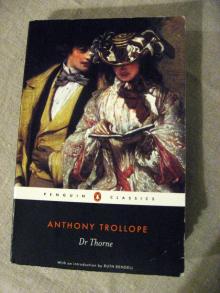 Doctor Thorne
Doctor Thorne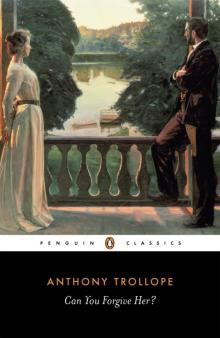 Can You Forgive Her?
Can You Forgive Her?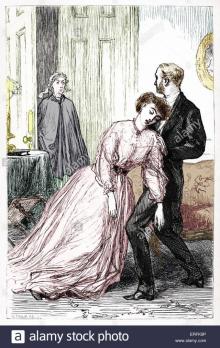 The Last Chronicle of Barset
The Last Chronicle of Barset The Fixed Period
The Fixed Period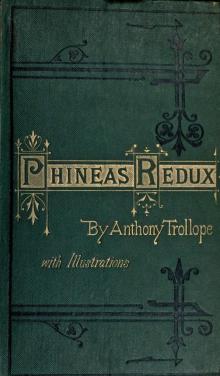 Phineas Redux
Phineas Redux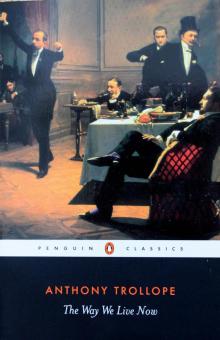 The Way We Live Now
The Way We Live Now Castle Richmond
Castle Richmond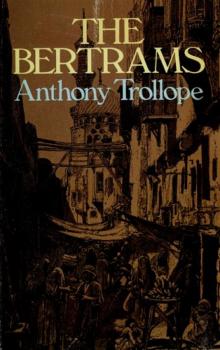 The Bertrams
The Bertrams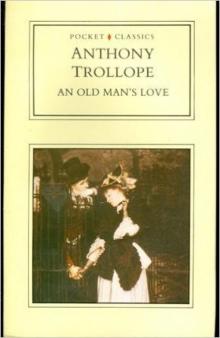 An Old Man's Love
An Old Man's Love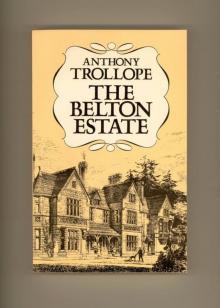 The Belton Estate
The Belton Estate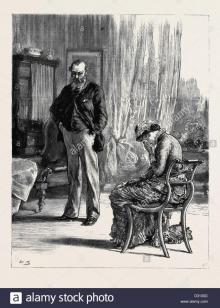 Marion Fay: A Novel
Marion Fay: A Novel The Claverings
The Claverings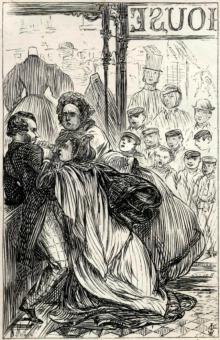 The Struggles of Brown, Jones, and Robinson
The Struggles of Brown, Jones, and Robinson Nina Balatka
Nina Balatka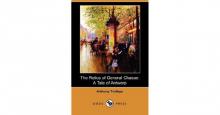 The Relics of General Chasse: A Tale of Antwerp
The Relics of General Chasse: A Tale of Antwerp Barchester Towers cob-2
Barchester Towers cob-2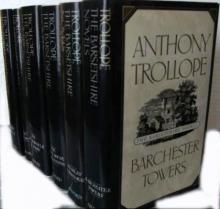 The Chronicles of Barsetshire
The Chronicles of Barsetshire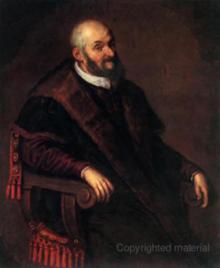 The Warden cob-1
The Warden cob-1 Framley Parsonage
Framley Parsonage Christmas at Thompson Hall
Christmas at Thompson Hall The Warden
The Warden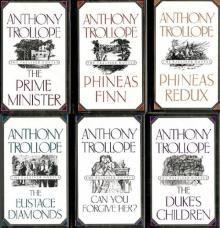 The Palliser Novels
The Palliser Novels The Small House at Allington
The Small House at Allington Barchester Towers
Barchester Towers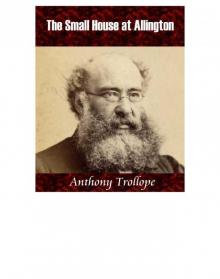 The Small House at Allington cob-5
The Small House at Allington cob-5 The Duke's Children
The Duke's Children Phineas Finn, the Irish Member
Phineas Finn, the Irish Member Autobiography of Anthony Trollope
Autobiography of Anthony Trollope